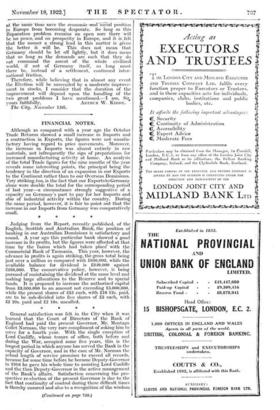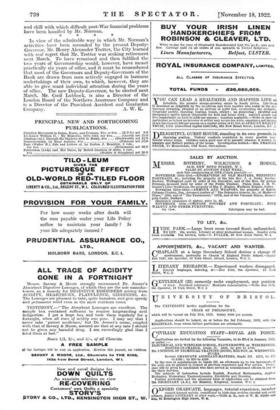FINANCIAL NOTES.
Although as compared with a year ago the October Trade Returns showed a small increase in Imports and a contraction in Exports, the figures were not unsatis- factory having regard to price movements. Moreover, the increase in Imports was almost entirely in raw materials, not infrequently the sign of preparations for increased manufacturing activity at home. An analysis of the total Trade figures for the nine months of the year reveals some interesting points, the principal being the tendency in the direction of an expansion in our Exports to the Continent rather than to our Overseas Dominions. Very striking, too, is the fact that our Exports to Germany alone were double the total for the corresponding period of last year—a circumstance strongly suggestive of a capacity on Germany's part to pay for her Imports and also of industrial activity within the country. During the same period, however, it is fair to point out that the increase in our Imports from Germany was comparatively small.
* Judging from the Report, recently published, of the English, Scottish and Australian Bank, the position of banking in our Australian Dominions is satisfactory and sound. A year ago this particular bank showed a good increase in its profits, but the figures were affected at that time by the fusion which had taken place with the Commercial Bank of Tasmania. This year, however, the advance in profits is again striking, the gross total being just over a million as compared with £836,000, while the available balance for dividend is £340,000 against £268,000. The conservative policy, however, is being pursued of maintaining the dividend at the same level and making large allocations to the Reserve and to special funds. It is proposed to increase the authorized capital from £3,000,000 to an amount not exceeding £5,000,000, while the present shares of £25 each, with £10 12s. paid, are to be sub-divided into live shares of £5 each, with £2 10s. paid and £2 10s. uncalled. * * * * General satisfaction was felt in the City when it was learned that the Court of Directors of the Bank of England had paid the present Governor, Mr. Montagu Collet Norman, the very rare compliment of asking him to serve for a fourth year. With the single exception of Lord Cunliffe, whose tenure of office, both before and during the War, occupied some five years, this is the longest period in which anyone has served the Bank in the capacity of Governor, and in the case of Mr. Norman the actual length of service promises to exceed all records, because for some time before he became Deputy-Governor in 1916 he gave his whole time to assisting Lord Cunliffe and the then Deputy-Governor in the active management of the Bank's affairs. Satisfaction concerning the pro- spective re-election of the present Governor is due to the fact that continuity of control during these difficult times is thereby ensured and also to a recognition of the wisdom (Continued on page 738.) and skill with which difficult post-War financial problems have been handled by Mr. Norman.
In view of the admirable way in which Mr. Norman's activities have been seconded by the present Deputy- Governor, Mr. Henry Alexander Trotter, the City learned with real regret that Mr. Trotter was seeking retirement next March. To have remained and then fulfilled the two years of Governorship would, however, have meant practically six years of office, and it must be remembered that most of the Governors and Deputy-Governors of the Bank are drawn from men actively engaged in business undertakings of their own, to which, however, they are able to give scant individual attention during the years of office. The new Deputy-Governor, to be elected next March, Mr. Cecil Lubbock, is also a Director of the London Board of the Northern Assurance Company and is a Director of the Provident Accident and Guarantee







































 Previous page
Previous page